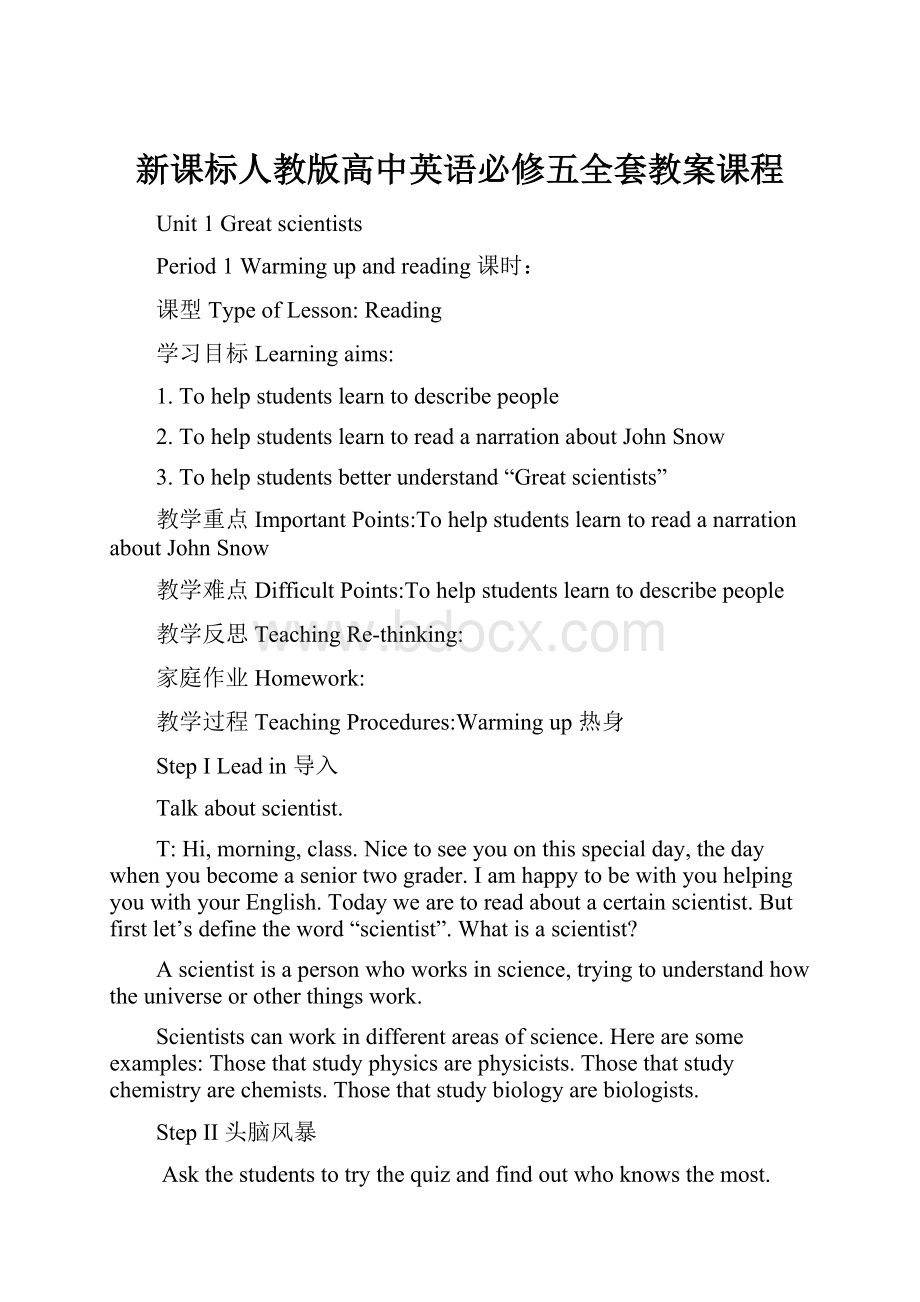新课标人教版高中英语必修五全套教案课程.docx
《新课标人教版高中英语必修五全套教案课程.docx》由会员分享,可在线阅读,更多相关《新课标人教版高中英语必修五全套教案课程.docx(118页珍藏版)》请在冰豆网上搜索。

新课标人教版高中英语必修五全套教案课程
Unit1Greatscientists
Period1Warmingupandreading课时:
课型TypeofLesson:
Reading
学习目标Learningaims:
1.Tohelpstudentslearntodescribepeople
2.TohelpstudentslearntoreadanarrationaboutJohnSnow
3.Tohelpstudentsbetterunderstand“Greatscientists”
教学重点ImportantPoints:
TohelpstudentslearntoreadanarrationaboutJohnSnow
教学难点DifficultPoints:
Tohelpstudentslearntodescribepeople
教学反思TeachingRe-thinking:
家庭作业Homework:
教学过程TeachingProcedures:
Warmingup热身
StepILeadin导入
Talkaboutscientist.
T:
Hi,morning,class.Nicetoseeyouonthisspecialday,thedaywhenyoubecomeaseniortwograder.IamhappytobewithyouhelpingyouwithyourEnglish.Todaywearetoreadaboutacertainscientist.Butfirstlet’sdefinetheword“scientist”.Whatisascientist?
Ascientistisapersonwhoworksinscience,tryingtounderstandhowtheuniverseorotherthingswork.
Scientistscanworkindifferentareasofscience.Herearesomeexamples:
Thosethatstudyphysicsarephysicists.Thosethatstudychemistryarechemists.Thosethatstudybiologyarebiologists.
StepII头脑风暴
Askthestudentstotrythequizandfindoutwhoknowsthemost.
T:
Therearesomegreatscientificachievementsthathavechangedtheworld.Canyounamesomeofthem?
Whatkindofroledotheyplayinthefieldofscience?
Dotheseachievementshaveanythingincommon?
Matchtheinventionswiththeirinventorsbelowbeforeyouanswerallthesequestions.
1.Archimedes,AncientGreek(287-212BC),amathematician.
2.CharlesDarwin,Britain(1808-1882).ThenameofthebookisOriginofSpecies.
3.ThomasNewcomen,British(1663-1729),aninventorofsteamengine.
4.GregorMendel,Czech,abotanistandgeneticist.
5.MarieCurie,PolishandFrench,achemistandphysicist.
6.ThomasEdison,American,aninventor.
7.LeonardodaVinci,Italian,anartist.
8.SirHumphryDavy,British,aninventorandchemist.
9.ZhangHeng,ancientChina,aninventor.
10.StepperHawking,British,aphysicist.
II.Pre-reading预读
StepI
Getthestudentstodiscussthequestionsonpage1withtheirpartners.Thenaskthestudentstoreporttheirwork.Encouragethestudentstoexpresstheirdifferentopinions.
1.Whatdoyouknowaboutinfectiousdiseases?
Infectiousdiseasescanbespreadtootherpeople.Theyhaveanunknowncauseandneedpublichealthcaretosolvethem.Peoplemaybeexposedtoinfectiousdisease,somayanimals,suchasbirdflu,AIDS,SARSareinfectiousdiseases.Infectiousdiseasesaredifficulttocure.
2.Whatdoyouknowaboutcholera?
CholeraistheillnesscausedbyabacteriumcalledVibriocholerae.Itinfectspeople’sintestines(肠),causingdiarrheaandlegcramps(抽筋).
Themostcommoncauseofcholeraisbysomeoneeatingfoodordrinkingwaterthathasbeencontaminated(污染)withthebacteria.
Choleracanbemild(不严重的)orevenwithoutimmediatesymptoms(症状),butaseverecasecanleadtodeathwithoutimmediatelytreatment.
3.Doyouknowhowtoproveanewideainscientificresearch?
Anybodymightcomeoutwithanewidea.Buthowdoweproveitinscientificresearch?
Therearesevenstagesinexamininganewideainscientificresearch.Andtheycanbeputinthefollowingorder.Whatorderwouldyouputthesevenin?
Justguess.
Findaproblem→Makeupaquestion→Thinkofamethod→Collectresults→
Analysetheresults→Drawaconclusion→Repeatifnecessary
Unit1Greatscientists
Period1Warmingupandreading课时:
课型TypeofLesson:
Reading
学习目标Learningaims:
1.Tohelpstudentslearntodescribepeople
2.TohelpstudentslearntoreadanarrationaboutJohnSnow
3.Tohelpstudentsbetterunderstand“Greatscientists”
教学重点ImportantPoints:
TohelpstudentslearntoreadanarrationaboutJohnSnow
教学难点DifficultPoints:
Tohelpstudentslearntodescribepeople
教学反思TeachingRe-thinking:
家庭作业Homework:
教学过程TeachingProcedures:
III.Reading阅读
StepIPre-reading预读
1.DoyouknowJohnSnow?
JohnSnowisawell-knowndoctorinthe19thcenturyinLondonandhedefeated“KingCholera”.
2.Doyouknowwhatkindofdiseaseischolera?
Itisakindofterriblediseasecausedbydrinkingdirtywateranditcausedalotofdeathsintheoldtimesanditwasverydifficulttodefeat.
Let’sgettoknowhowDr.JohnSnowdefeated“KingCholera”in1854inLondoninthisreadingpassage:
StepIISkimming扫读
Readthepassageandanswerthequestions.
1.Whodefeats“KingCholera“?
(JohnSnow)
2.Whathappenedin1854?
(CholeraoutbreakhitLondon.)
3.Howmanypeoplediedin10days?
(500)
4.WhyistherenodeathatNo.20and21BroadStreetaswellasatNo.8and9CambridgeStreet?
(ThesefamilieshadnotdrunkthewaterfromtheBroadStreetpump.)
(Optional)
Skimthepassageandfindtheinformationtocompletetheformbelow.
Who
When
What
How
Result
JohnSnow
1854
helpingordinarypeopleexposedtocholera
Examiningthesourceofallwatersuppliesandfindingnewmethodsofdealingwithpollutedwaster
“KingCholera”defeated
StepIIIScanning找读
Readthepassageandnumbertheseeventsintheorderthattheyhappened.
2JohnSnowbegantotesttwotheories.
1AnoutbreakofcholerahitLondonin1854.
4JohnSnowmarkedthedeathsonamap.
7Heannouncedthatthewatercarriedthedisease.
3JohnSnowinvestigatedtwostreetswheretheoutbreakwasverysevere.
8KingCholerawasdefeated.
5Hefoundthatmostofthedeathswerenearawaterpump.
6Hehadthehandleremovedfromthewaterpump.
StepIVMainideaandcorrectstage精读
Readthepassageandputthecorrectstagesintothereadingaboutresearchintoadisease.
JohnSnowDefeats“KingCholera”
Paragraph
Stages
Generalideas
1
Findaproblem:
Whatcausethecholera?
Thecausesofcholera
2
Makeupaquestion:
Whichisright?
Thecorrectorpossibletheory
3
Thinkofamethod:
Testtwotheory
Collectdataonwherepeoplewereillanddiedandwheretheygottheirwater
4
Collectresults:
Markthedeath
Plotinformationonamaptofindoutwherepeoplediedordidnotdie
5
Analyzetheresults:
Findtheresourceofthewater
Lookintothewatertoseeifthatisthecauseoftheillness
6
Findsupportingevidence
Findotherevidencestoconfirmhisconclusion
7
Drawaconclusion
ThepolluteddirtysourceofdrinkingwaterwastoblameforthecauseoftheLondoncholera
StepVGroupdiscussion分组讨论
Answerthequestions(Finishexercise2onPage3)
1.JohnSnowbelievedIdea2wasright.Howdidhefinallyproveit?
(JohnSnowfinallyprovedhisideabecausehefoundanoutbreakthatwasclearlyrelatedtocholera,collectedinformationandwasabletotiecasesoutsidetheareatothepollutedwater.)
2.DoyouthinkJohnSnowwouldhavesolvedthisproblemwithoutthemap?
(No.ThemaphelpedJohnSnoworganizehisideas.Hewasabletoidentifythosehouseholdsthathadhadmanydeathsandchecktheirwater-drinkinghabits.Heidentifiedthosehousesthathadhadnodeathsandsurveyedtheirdrinkinghabits.Theevidenceclearlypointedtothepollutedwaterbeingthecause.)
3.Choleraisa19thcenturydisease.Whatdiseasedoyouthinkissimilartocholeratoday?
(Twodiseases,whicharesimilartoday,areSARSandAIDSbecausetheyarebothserious,haveanunknowncauseandneedpublichealthcaretosolvethem.
)
StepVI概括总结
Usingthestagesforscientificresearchandwriteasummary.
Unit1Greatscientists
Period2&3Languagefocus课时:
课型TypeofLesson:
Words&Expressions
学习目标Learningaims:
Tohelpstudentslearntousesomeimportantwordsandexpressions
教学重点ImportantPoints:
Tohelpstudentslearntoremembersomeimportantwordsandexpressions
教学难点DifficultPoints:
Tohelpstudentslearntousesomeimportantwordsandexpressions
教学反思TeachingRe-thinking:
家庭作业Homework:
教学过程TeachingProcedures:
StepIWarmingup热身
1.characteristic
1n.aqualityorfeatureofsth.orsomeonethatistypicalofthemandeasytorecongnize.特征;特性
WhatcharacteristicsdistinguishtheAmericansfromtheCanadians.
②a.verytypicalofaparticularthingorofsomeone’scharacer典型性的,
Suchbluntnessischaracteristicofhim.
WindydaysarecharacteristicofMarch.
[辨析]characteristic与character
characteristic是可数名词,意为“与众不同的特征“
character表示(个人、集体、民族特有的)“性格、品质”,还意为“人物;文字”
Whatyouknowabouthimisn’thisrealcharacter.
2.putforward:
tostateanideaoropinion,ortosuggestaplanorperson,forotherpeopleto
consider提出
Heputforwardanewtheory.
Theforeignershaveputforwardaproposalforajointventure.
AninterestingsuggestionformeasuringtheatmospherearoundMarshasbeenputforward.
☆puton穿上;戴上;增加putout熄灭(灯);扑灭(火)putupwith…忍受putdown写下来;放下;putoff耽误;延期putup建立;建造,
putup举起,搭建,粘贴
3.analyze:
toexamineorthinkaboutsomethingcarefullyinordertounderstanditvt.分析结果、检讨、细察
Acomputeranalysesthephotographssentbythesatellite.
TheearthquakeexperttriedtoanalyzethecauseoftheearthquakeoccurredonMay12,2008.
Let’sanalyzetheproblemandseewhatwentwrong.
Heanalyzedthefoodandfoundthatitcontainedpoison.
Wemusttrytoanalyzethecausesofthestrike.
☆analysisn.分析,解析,分解
4.conclude:
decidethatsth.istrueafterconsideringaltheinformationyouhave得出结论;推论出toendsth.suchasameetingorspeechbydoingorsayingonefinalthingvt.&vi结束,终止;
Weconcludedthemeetingat8o’clockwithaprayer.
Fromhisappearancewemaysafelyconcludethatheisaheavysmoker.
Whatdoyouconcludefromthesefacts?
Weconcludetogoout/thatwewouldgoout.
conclusionn.结论
arriveataconclusion;cometoaconclusion;drawaconclusion;reachaconclusion
Whatconclusiondidyoucometo/reach